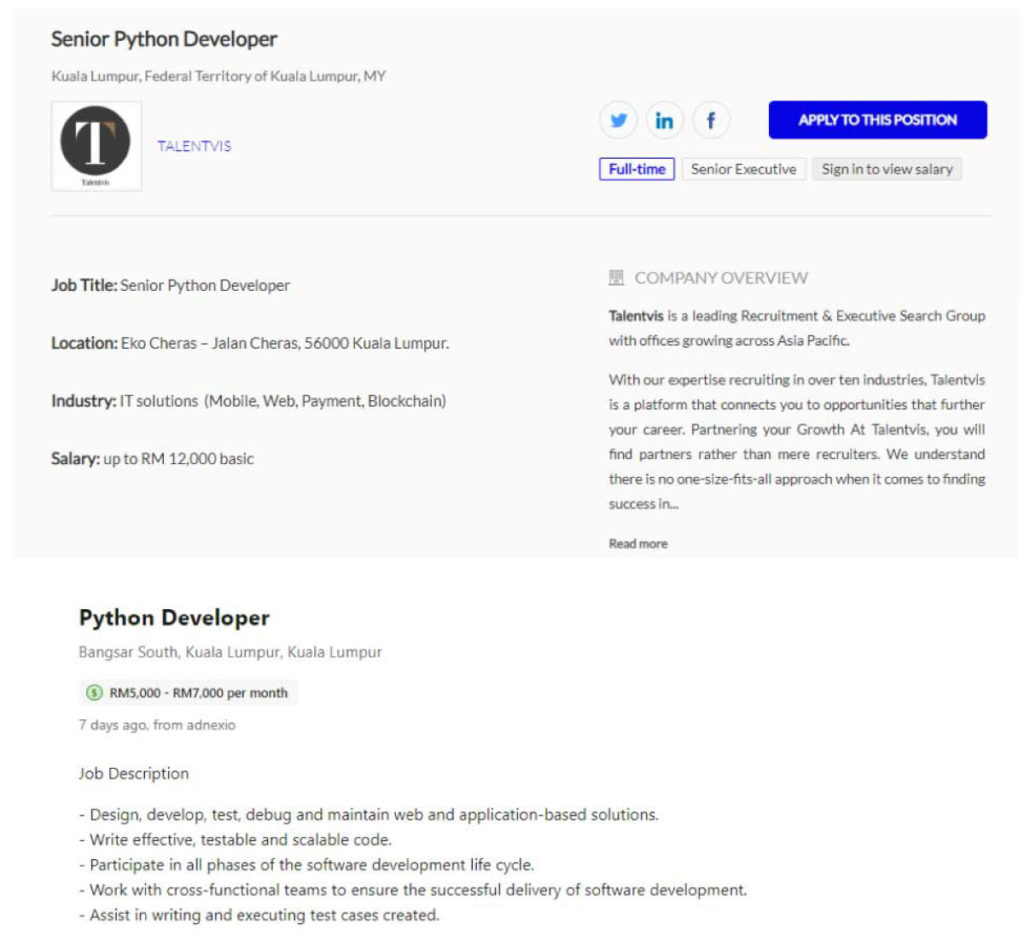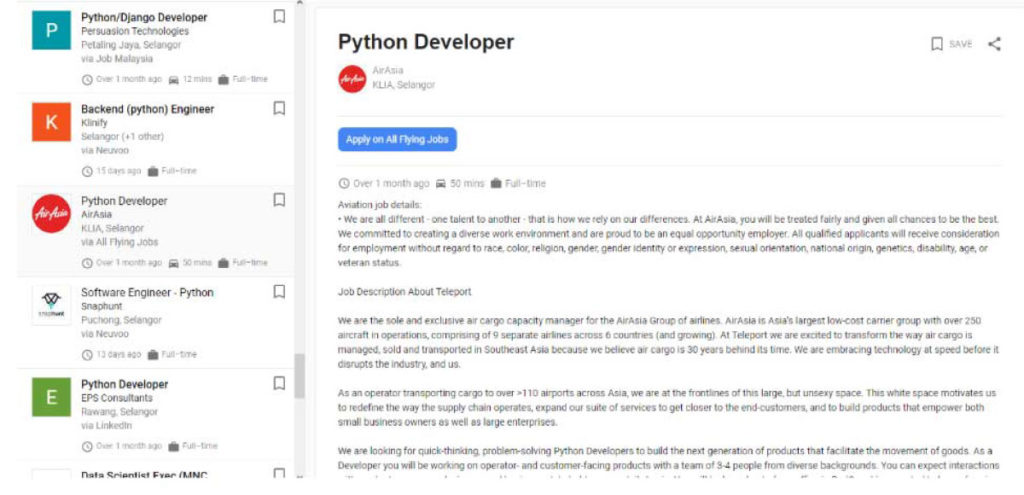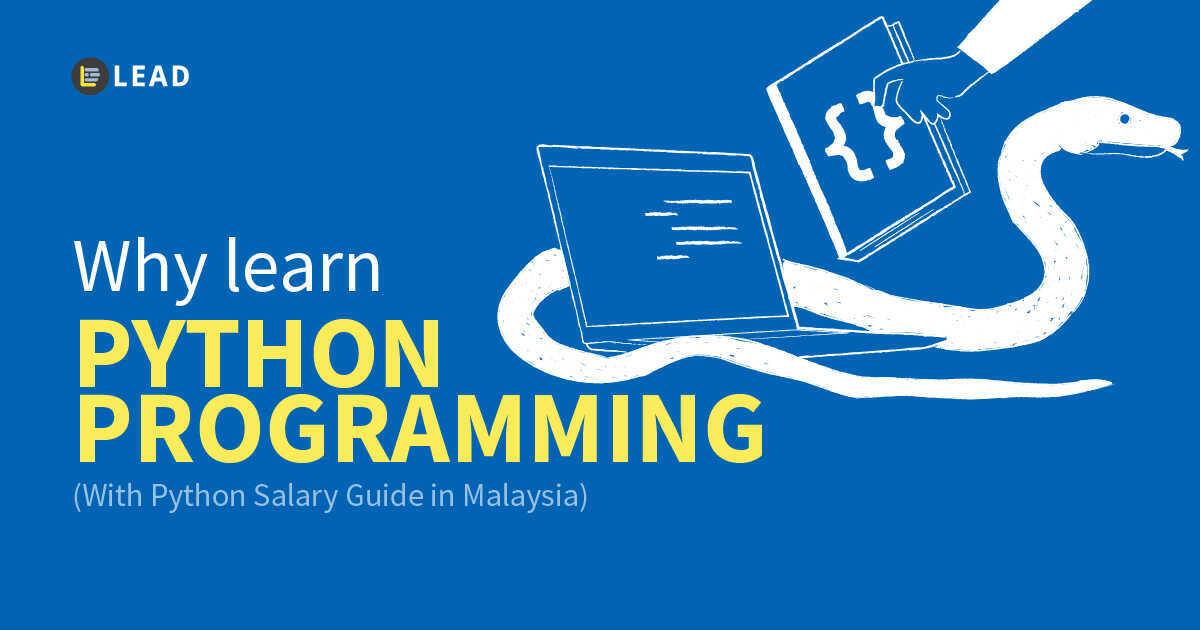Lately, you may have heard that Python has been deemed as ‘the most popular programming language’ in the market.
But what exactly is Python and why it has been so often talked about and discussed by developers, data scientists, software engineers, and even hackers?
What Is Python?
Python is a general-purpose programming language that can perform a wide range of tasks.
It can efficiently conduct simple tasks like processing huge chunks of data and sending automated receipts while handling more complex tasks such as building Artificial Intelligence (AI) models; data analysis and visualization; and cybersecurity programs.
Despite being a ‘high-level language’ which enables Python to accomplish many tasks, the programming is relatively easy to learn as it has a fairly clean syntax (rules for computer language). This makes it highly recommendable for both beginners.
Python helps aspiring developers write codes faster, optimize developer resources, and give them access to existing libraries and frameworks so that developers don’t need to be build from scratch.
Even experienced programmers would find good a use for its versatility, flexibility, and object-oriented features.
Why Should You Learn Python Programming Anyway?
In recent times, Python has become the choice of programming language for introductory computer science courses in top-ranked universities.
According to TechRepublic, a Python developer is among the top 10 most in-demand jobs of 2019.
Citing the online tech journal, Python is the fastest-growing programming language out there.
Because of its flexibility, many famous companies around the world such as Instagram, Spotify, and Google use Python to build web applications and create automations.
Learning how to use Python will provide many job opportunities. In Malaysia itself, there has been a rising demand for Python developers, software engineers and data scientists from household brands like AirAsia, IKEA, and KPMG.
In-line with our government and MDEC multiple digitization initiative, you’re given countless opportunities to get on learning Python. And if you’re still contemplating “would Python be worth learning?
Well, let’s look at the utilities that Python has.
5 Popular Uses For Python Programming
1 – Task automation
If you’ve ever spent hours relabeling files or updating hundreds of spreadsheet cells, you’ll certainly understand how tedious tasks like these can be. However, what if you could get your computer to do them for you?
Imagining how much time would you save if you could build programs that automatically simple administrative tasks.
By developing an automation script in Python, you can quickly perform the following tasks quickly without much of a hassle:
- sending emails;
- posting social media posts on multiple platforms;
- calculating a spreadsheet;
- and sending a notification whenever a website updates.
Whether you’re an accountant, business owner, marketer or office worker – having the skill set to build automation scripts helps you work smarter and more efficiently.
So, ask yourself, would you rather spend your time doing work a well-trained monkey could do or spend it on strategic tasks?
Even if you’ve never written a line of code, you could make your computer do the mundane work. Learn how you can program your computer to do so.
2 – Building Web Applications
Web applications and internet development are one of the most common uses for Python. Thanks to its advancements, Python changes the way we build and design things within a program.
Python’s versatility allows it to be compatible with multiple systems and platforms.
For example Netflix uses Python to make open source codes such as Netflix OSS, which is a set of frameworks and libraries designed to solve problems that occur across multiple components in different devices.
Python’s web frameworks – such as CherryPy, Flask, Django – makes a developer’s work a lot easier with its extensive libraries and modules. Netflix itself has close to 19 Python-based repositories readily available in Github.
This makes crucial processes such as content management, error tracking, data authorization, and profiling are sped up tenfold.
Python can also be implemented with other programming languages such as:
- Jython – Python integrated with Java.
- CPython – Python integrated with C.
- RubyPython – Python integrated with Ruby.
- Web Testing
In relation to the previous point, website applications and other related web interfaces must also be tested before they go live on site.
Python is the best choice among programmers when it comes to web testing, because it has a built-in unit test framework called ‘PyUnit’.
PyUnit is a form of test automation that supports test aggregation, test collections, and test reporting to ensure the code is working the way you expect it to.
Thanks to its impressive string manipulation and easy shell access, Python is extremely useful for smooth automating repetitive tasks.
3 – Data extraction/web scraping
With most companies relying on data to make decisions, there comes a need for data collection and cleansing.
This is where Python’s many libraries come in handy. Python has a host of web scraping tools, such as ‘urllib2’ and ‘Selenium’ that can extract large amounts of data online into a local computer file or a spreadsheet.
They also have many frameworks like ‘Scrappy’ or library like ‘Beautiful Soup’ can efficiently retrieve online data or web page content.
This gives companies a key advantage because programming web scraping scripts on Python is not only fast but also open-source and free.
Python’s web scraping would be prove to be very useful for those in sales & marketing, e-commerce, or advertising fields,
4 – Cybersecurity
Python is also no small player when it comes to cybersecurity. It is known to respond to security threats faster than other programming languages, with powerful libraries such as Nmap, Requests, and Yara.
If you are an IT Security professional, you can use Python to run a penetration test on web applications to detect any system breaches.
To avoid ‘cyber exploitation’ by hackers, you can also build an impenetrable application by using Python’s strong typing script. This can also be reinforced by the application’s digital forensic capabilities.
Who Should Learn Python Programming?
Python is advantageous for many people with different working backgrounds even if they are beginners.
To show how versatile Python is, we have compiled 5 very different industries who utilize this programming language in their own way:
1 – Insurance
Fresh Business insight can be made with python through machine learning, which is the study of computer algorithms.
Machine learning allows a company to see potential changes and predict more accurate foresight in areas such as cash flow, staffing, delivery times, and even liquidity.
2 – Aerospace
Python is slowly replacing legacy language like Ada in the aerospace industry to create software for critical safety systems. This is because Python has added benefits of being able to script tasks, create GUIs, and analyse data science.
3 – Retail Banking
Python’s most important use in retail banking is its flexible data transformation and manipulation. With advanced data analytics, retail bankers can enhance customer experience, fraud management systems and basic operations.
4 – Healthcare
Similar to other industries, automation and data analytics could be a key factor in efficiency, but holds a more vital advantage as it could save lives.
Through Python, machine learning can be utilized to make decisions, suggest treatments and get the best possible patient outcomes in a more efficient, time-saving manner.
5 – Consulting Services
The flexibility of Python allows developers to create bespoke websites, which is a unique website with codes built entirely from scratch. This makes the website faster, more advanced, easier to update, and more secure.
Bespoke web development can also be built by using a theme, which makes it stand out from other websites.
How Much Is the Salary of a Python Developer in Malaysia?
The digitization process of companies has become unavoidable during and after the pandemic, and Python programmers – or any programmer in general – have become high-demand assets for any company.
According to Indeed, the average Python developer salary in the US in 2020 is $120K per year (or $56.75 per hour), which grew by 14% for the last 4 years.
In Malaysia, the average salary for an entry-level Python programmer in Malaysia starts at RM4,000. Senior programmers could ask for up to RM12,000, while even higher positions… well, you get the gist.

How do you get the most as a Python developer? Simply extend your skill set further and upgrade yourself to be a full stack developer who can work on both front-end and back-end development.
Full stack developers can usually ask for a higher salary or rate, because their diverse skill set enables them to solve more problems which in turn increases your demand.
In short, python developers and programmers are highly in-demand across industries now, and the opportunity and accessibility to ‘upskill’ yourself quickly is a click away.
Here are some quick snapshots of the latest job postings in Malaysia:


And if you’re who loves to constantly analyze stuff, probably this would help you:

Get Started Fast with a Python Programming Course In Malaysia
Because of its vastly growing popularity, there has been an increasing number of courses, workshops, and training for Python.
There are many flexible learning options – virtual classes, both public and private classes, as well as dedicated training courses and even door-to-door services.
Employers who want to upskill their staff can also rest assured that course fees are claimable from Pembangunan Sumber Manusia Berhad (PSMB), and all of them are HRDF-registered training providers.
If you are looking for a Python learning course for beginners, you can check out LEAD – Python 360.
Over the course of 4 days, you would be able to:
- Write programs,
- Go into data science,
- Launch your programming career!
Once you finish your first Python 360 class, you are welcome to come back for class refreshers during any future Python 360 intakes. The program is HRDF are claimable.
Conclusion
While more and more businesses are transcending into the digital era, the demand for a programmer – or a Python programmer – would continue to increase in the coming year.
So what’re you waiting for? Get Python and start programming! Let us know in the comments about your thoughts on Python? Request for article topics are welcome.


Can i be Python developer in Malaysia without degree?
Yes, you can. And here are some key skills that you need to pick up:
This should be enough as a start, let me know how it goes or if you face any problem.
can i be a python developer or other Related Occupation without any diploma or degree certificate in related field like IT or computer science in Malaysia? I means self taught learning…
Sorry for the late reply Winson, but yes, you can. But you will need to be able to show to the company that you are able to deliver.
Apart from the programming concepts that I have mentioned above, you may want to pick up from fundamentals concepts such as how to implement algorithms, and Big O notation, optimisation. They are not compulsory but will definitely increase your chances of being hired.